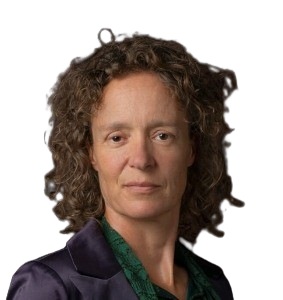This article was originally written for Gaykrant for Lesbian Visibility Week in April 2022. Bianca Nijhof, Associate Director at Anthesis, gives a glimpse into her life and her experiences of being part of the LGBTQIA+ community.
What do you do in daily life and what is your contribution to the community?
I just accepted a new challenge. For the past three years, I was Director of the Netherlands Water Partnership, a great role in which I was given the opportunity to contribute to solving global water challenges (too much, too little and too polluted) using the knowledge and skills of the Dutch water sector, while at the same time increasing the earning capacity of the Dutch water sector. In my role as Director I always paid attention to Diversity & Inclusion (D&I), the needs and position of the LGBTQIA+ community included.
In April, I started as Associate Director at Anthesis Group; the sustainability activator and certified B Corp. I use my expertise in the field of water, biodiversity, environmental social governance and climate adaptation to help clients devise and implement smart solutions. Solutions that have a sustainable impact and are economically profitable. In addition, I will certainly also provide my input regarding LGBTQIA+ and broader inclusion within Anthesis Group, where we are now in the process of designing and implementing the JEDIA program (justice, equity, diversity, inclusion, accessibility). In addition to my regular work, I am co-chair of the Workplace Pride Foundation where I am specifically committed to the community with a focus on intersectionality. From my role in the Advisory Group of the Capitals Coalition, I highlight the importance of being who you are, from the perspective of recognizing the value of social capital. So I mainly try to contribute by influencing parties. In addition, I am open about who I am. In doing so I hope to make others within our community (also) feel seen and recognised.
How do you identify in gender and sexuality?
I identify as a woman who loves women.
Do you think it is important to present yourself as such to others?
I like to see myself as a unique person. I don’t like to be labelled. In our society, we have created so many boxes, but there’s not one set of boxes that covers it all. Why not celebrate being unique? Why not respect the other for the unique individual he/she/they are.
What’s the most positive thing you’ve ever experienced about being non-straight/non-cisgender?
During a trip to Asia for my job at the time, a good friend of mine introduced me to a group of friends; women who mainly identify as lesbian and bisexual. From the first moment I felt welcome and at home.
What’s the most negative thing you’ve ever experienced about being non-straight/non-cisgender?
I haven’t felt safe enough at work to be open about who I love for a long time. For years that was just the way it was, I didn’t know otherwise. But in retrospect that has been quite a stressor. I think a striking expression in that context is: it’s as if you have seen life in black and white, and at the moment you can be yourself you suddenly see life in full colour.
Who are the greatest examples in your life?
There are several:
- From my work, people like Paul Polman (ex-CEO Unilever, founder IMAGINE) and Christiana Figueres (UNFCCC lead during Paris Climate Agreement 2015). To me, both are people who, with their holistic view of a world in balance, have converted theory into concrete actions and in doing so getting organisations and people on board. At the same time they both have their feet firmly on the ground, and they have an eye for the small personal things that make life important.
- Jan Frodeno, triathlete (World Long Distance Champion, Olympic Champion): unbelievable how he is world class in completely different disciplines. What an example of being in touch with your body, having the ability to adapt and having an enormous willpower.
- And last but not least several people that I have met, e.g. the para-athletes with whom I have participated in (international) competitions (para-triathlon and para-cycling). They have taught me that it is not about what you cannot do (=disabilities), but about having different abilities. Or my friends in Asia, who have created a warm safe haven in a world where being yourself and loving who you want to love is not accepted. Think in possibilities!
What is your motto?
Be honest with yourself and be your unique authentic self!
What should be done tomorrow to change the position of LGBTQIA+ people and that of women in particular?
I recently read about a reverse quota: a maximum number of men, instead of a minimum number of women in e.g. Supervisory Boards. I think that’s a refreshing approach. It appeals to me because it shows awareness of dealing with a prejudice. It also counterbalances the fact that we keep naming what we don’t have yet or strive for; in this way we name what we (already) do have. Hopefully, it will make the conversation more about what it should be about: diversity and inclusion. However, I also like to see the conversation about more than gender; e.g. also about LGBTQIA+ and neurodiversity. Hence my focus on intersectionality; there are so many different characteristics and the combinations of these make us unique as individuals. There’s so much reward in terms of creative, dynamic input if you let someone who thinks from a different perspective, participate in your organisation or your team.
How would you most like to be remembered?
Good question, but the answer? It’s not what drives me. I hope that I can contribute to a world in which we all live in balance with our natural environment, and where we can provide a dignified existence to all. I hope that by being open about who I am, I make others feel like they are allowed to be who they are.
